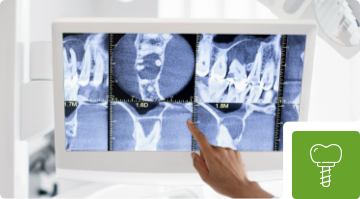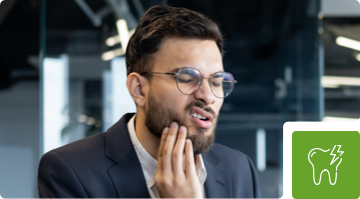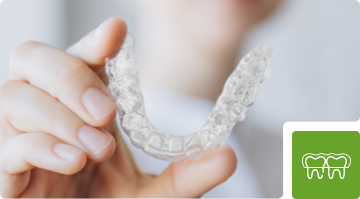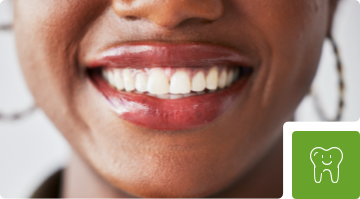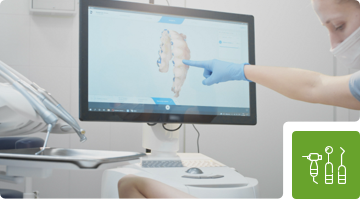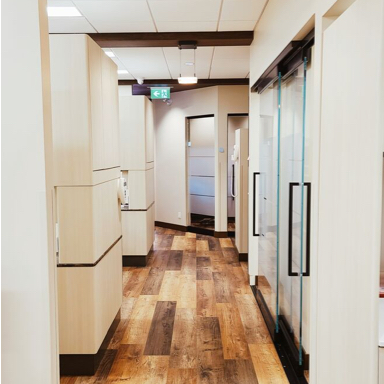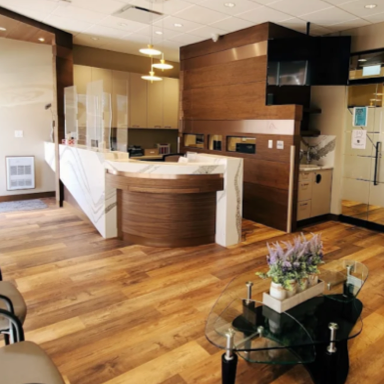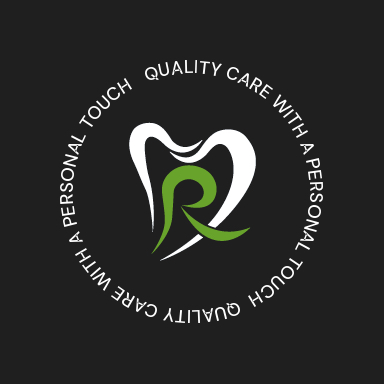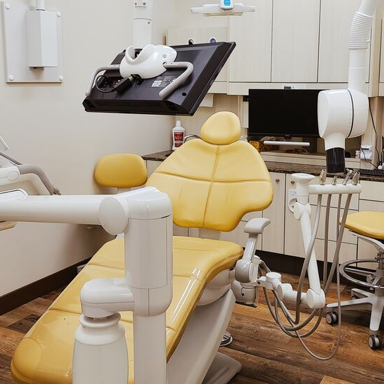You might wake up with a dull headache or a sore jaw and not know why. These feelings can be signs of teeth grinding, a common condition called bruxism. Bruxism often happens while you sleep, so you may not even realize you’re doing it.
You can tell if you grind your teeth at night by paying attention to symptoms like frequent headaches, jaw soreness, and visible changes to your teeth that can lead to increased tooth sensitivity. A sleep partner might also hear the grinding sounds while you are asleep.
Noticing these signs is the first step toward finding a solution, which often starts with a discussion during your regular dental exam.
What Is Nighttime Teeth Grinding?
Bruxism is the term for grinding or clenching your teeth. When you grind your teeth at night, this is referred to as sleep bruxism. Since you do it unconsciously, it’s considered a sleep-related movement disorder.
This habit often happens without you even knowing it. People who grind their teeth at night are sometimes also more likely to have other sleep issues, like snoring.
Understanding what’s going on while you’re asleep can help you understand your symptoms during the day.
Common Signs & Symptoms of Bruxism
Because you’re asleep when it happens, you often learn about teeth grinding from the symptoms it leaves behind. You may notice several physical signs that point toward the condition. Pay attention to how you feel each morning.
Common signs can include:
- Tired, tight, or sore jaw muscles
- Dull headaches that start at your temples
- Jaw, neck, or face pain
- Pain that feels like an earache
- Increased tooth pain or sensitivity
- A sleep partner who hears you grinding your teeth
- Disrupted sleep
How Your Teeth & Jaw Are Affected
Over time, bruxism can leave visible clues on your teeth. Your jaw might also give you signs that something isn’t right, as the constant pressure puts a strain on your entire mouth.
These signs often include:
- Teeth that look flattened, fractured, chipped, or loose
- Worn tooth enamel that exposes the deeper layers of your teeth, like dentin
- A locked jaw that won’t open or close completely
- Clicking or popping sounds from the jaw joint (temporomandibular joint)
Why You Might Grind Your Teeth
The exact reasons for bruxism are not always clear—it’s often a mix of physical and psychological factors. However, certain factors can raise your risk. Knowing these potential causes can help you identify what might be contributing to the habit.
Stress & Your Personality
Emotions like anxiety, stress, anger, or frustration can lead to teeth grinding. When you’re dealing with these feelings, your body might react by tensing up, even in your sleep. Your personality type can also play a role, as people with more competitive or focused personalities may have a higher chance of developing bruxism.
Lifestyle Choices & Other Substances
Some of your daily habits can contribute to teeth grinding. These actions can stimulate your muscles and make clenching more likely, especially as you wind down for the night. Think about your routine before bed.
These lifestyle factors include:
- Drinking caffeinated beverages or alcohol
- Smoking tobacco
We also offer dental care tips for smokers, which can help protect oral health
Certain Medications & Health Conditions
In some cases, bruxism can be linked to other health conditions. These include sleep apnea, gastroesophageal reflux disorder (GERD), and ADHD. It can also appear as a side effect of some medications, such as certain types of antidepressants.

Long-Term Effects of Teeth Grinding
For many people, bruxism doesn’t cause serious problems. However, if it happens frequently and goes unaddressed, it can lead to other issues. The constant force and pressure of teeth grinding can take a toll on your oral health over time.
Consistent, severe grinding can lead to problems such as:
- Damage to your teeth, requiring restorative work like dental crowns or bridges
- Frequent tension-type headaches
- Serious conditions that affect the temporomandibular joints (TMJs)—the joints in front of your ears
How to Manage Grinding & Clenching
If you think you grind your teeth, a conversation with a dental professional can be a helpful first step. They can look for signs of bruxism during a routine exam. Your dentist can also discuss potential solutions that may work for you.
A Professional Diagnosis & Treatment Options
In order to determine whether you have bruxism, your dentist can check for excessive wear on your teeth, like tiny chips or cracks. They’ll also look at your jaw and ask about any pain or discomfort you feel. If they confirm you have bruxism, they might suggest some options to protect your smile.
Your dentist may recommend one of several approaches. These can include a custom mouth guard to wear at night or a splint to keep your teeth separated. A mandibular advancement device (MAD) may also be an option to hold your jaw in a fixed position while you sleep.
Try At-Home Adjustments
Along with professional help, some simple lifestyle adjustments may help you manage teeth grinding. These small changes can reduce tension in your jaw muscles. They can help you feel more comfortable day to day.
You can try to:
- Use stress management techniques to help you relax
- Avoid or cut back on beverages that can harm your oral health, including those that contain caffeine or alcohol, especially before bed
- Train yourself to hold your jaw in a relaxed position during the day
If you suspect you’re grinding your teeth, you don’t have to manage it alone. The team at Chinook Village Dental is here to help you understand your symptoms and explore your options. Schedule a visit with us today to take the next step toward a more comfortable smile.



